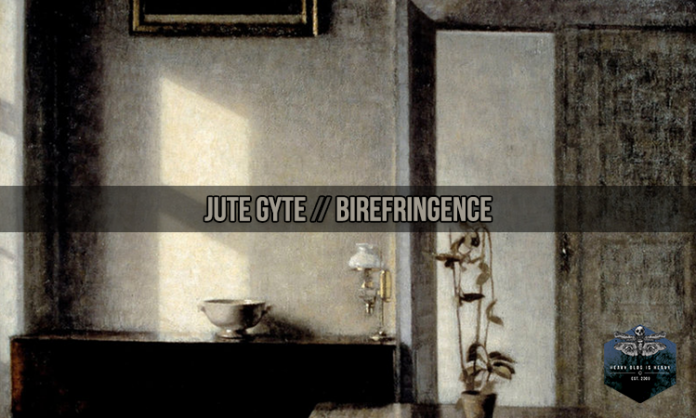Up to this point, Jute Gyte has made an almost annual tradition of releasing the boldest black metal album of the year. With this project, multi-instrumentalist Adam Kalmbach has channeled the black metal blueprint through classical composition techniques—microtonality and serialism, primarily—and paired the results with elements of dark ambient, industrial, and noise. His recent output has been particularly exceptional, with our staff bestowing high praise on albums like Perdurance (2016), The Sparrow (2017), and Oviri (2017). Each release is challenging and rewarding in its own way, as Kalmbach continuously reconstructs his music around different ideas.
It’s a rare, rewarding feat when an already ambitious artist manages to enhance their music further, which is exactly what Jute Gyte has accomplished on Birefringence. While Kalmbach still employs advanced compositional concepts with these tracks, he revealed via Bandcamp that “this album was written more freely than the last few.” As a result of that, Birefringence is far and away Jute Gyte’s strongest release in recent memory. The album just as experimental as Kalmbach’s back catalog while also boasting a fresh, varied approach that makes its density all the more worthwhile to parse out.
First, let’s address the elephant in the room regarding the ability of listeners to “get” Jute Gyte’s music. I’ll openly admit to my limited background with music theory, which is why I was happy to link to articles explaining microtonality and serialism rather than attempting to explain them myself. Yet, despite Jute Gyte’s incredible complexity, Kalmbach’s approach to songcraft produces music that’s universally enjoyable to those with an affinity for avant-garde music. Regardless of your own musical background, his compositions should strike you as intriguing and stimulating, making for an inherently worthwhile listening experience.
For instance, Kalmbach developed album opener “Angelus Novus” with “all pitches and some rhythms” serialized. While I can’t dissect precisely what that means, I can elaborate on the chaotic black metal maelstrom that’s produced as a result. A flurry of atonal notes and manic drumming coalesce into a disorienting swirl of noise, adorned with blackened shrieks from Kalmbach. It’s an admittedly jarring experience that could very well alienate some listeners. Yet, for anyone who enjoys bands like Deathspell Omega and wants to kick it up a notch, Jute Gyte is the perfect place to start and end your search. Though Kalmbach has proven this point time and time again over the years, “Angelus Novus” once again reinforces this narrative with perhaps even more urgency than before.
From there, the album twists and turns though truly surprising territory, even by Jute Gyte’s standards. If I’d ever imagined what microtonal blackgaze would sound like, I bet “Dissected Grace” would be a better manifestation than my prediction. The track follows a post-rock/shoegaze style song progression, with a hushed arpeggio exploding into a reverb-soaked crescendo. In typical Jute Gyte fashion, the quasi-melody dissipates into the darkness of atonality, as the latter half of the 15-minute behemoth is defined by cacophony and dissonance.
Kalmbach distills this down into creepy, standalone guitar chords plucked repetitively amid dark soundscapes. This continues on “Prosopons,” an equally unsettling track comprised of echoing guitar progressions, sporadic drumming, and effect-laden vocals. As the tempo picks up, Kalmbach marries his atonal guitarwork with a generous dose of heavy riffing in the background. It’s much more of a mid-paced, somewhat brutal affair, which churns and burns with continual motion and evolution.
Similar to “Dissected Grace,” the track essentially becomes a dark ambient track as it draws to a close. Skittering samples and noise keep the proceedings mystifying throughout; that is, until Kalmbach erupts with a straight-up, pummeling breakdown. It’s a shocking development, more so because I never expected to hear such a conventional motif in Jute Gyte’s music. Yet, the choice pays off beautifully, making for one of the album’s finest moments and a spectacular finish for the track.
“The Unformed Volcanic Earth” expands the album’s dark ambient leanings into a full 12-minute experience, leading into a further development of this concept on the amazingly-titled “The Foam That Flows from the Mouths of Wild Boars.” It’s a subdued industrial ballad of sorts, almost akin to a more reserved Nine Inch Nails track. The haunting beauty and simplicity of the track are striking and offer continued variety and respite on the album.
Before too long, album closer “New Plastic” resumes the album’s dissonance, with a refined noise burst more in line with an experimental modern classical piece. In hindsight, the album implodes on itself, slowly easing out of the black metal foundation and embracing the darker sonic influences that inform Kalmbach’s songwriting.
A dense, challenging album warrants a verbose, overly long review, but I’ll conclude my thoughts for now. Birefringence is an exceptional achievement for Jute Gyte and arguably the finest avant-garde metal album of the year. Despite having little to nothing to prove, Kalmbach continues to push his songwriting into new directions with every release, resulting in a master class in synthesizing a diverse crop of ideas into a cohesive, rewarding album. There’s no sugarcoating the fact this is an uninviting listen, but those who brave the musical intensity will discover expert innovation within metal’s already expansive blueprint.
…
Birefringence is available now via Bandcamp.

